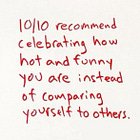Stop The Brainrot & Curate Your Perfect Media Diet. Here's How:
Defining a media diet, curating your intake, + a free workbook
Is My Brain Actually Rotting?
The short answer is, unfortunately, yes.
By absolutely no surprise to anyone, the Oxford English Dictionary 2024 Word of The Year is “Brainrot.”
The word “brainrot” saw a 230% increase in frequency of use in 2024, particularly in GenZ.
If you’re not familiar, brain rot is the feeling of deterioration of the brain due to constant consumption of low quality media.
The brain rot trend likely started in jest - meaning, our brain isn’t actually rotting…right?
Wrong.
One study found that social media addicts and cocaine addicts lose grey matter in the brain at alarmingly similar rates. Grey matter is the part of the brain that is responsible for emotional regulation, problem solving, and attention span.
It’s no coincidence, then, that overconsumption leaves you feeling upset, numb, and exhausted.
It’s time we edit our relationship to our devices to better serve our brains & our health. But how?
What’s A Media Diet?
If you’re not ready to delete all social media like I did in 2024, then you can moderate your use through a media diet.
A media diet is a special course of content that you consume to empower your highest & happiest self.
Adopting a media diet means you are selecting the media you consume the same way you would select the food you eat: with great care.
A media diet is not about abstinence, it’s about selectivity (consuming only what you love & what makes you feel good - this is different for each person).
A media diet is not a short cleanse. It’s about mastering your devices forever, instead of letting them master you; choosing your content, instead of letting the algorithm & social pressures choose it for you.
A media diet is about empowerment & choice. Rather than passively doomscrolling and feeling badly about yourself when you log out hours later, you set the parameters for what, how, and when you consume.
The Basics of a Media Diet
Consume mindfully - If you’re going to scroll, use a start time and stop time & be present with what you are consuming.
Consume only what you love - Pay attention to how each piece of content makes you feel. Defollow, mute, unsubscribe what doesn’t make you feel good (more on this below).
No numbing - Check in with your emotions before you reach for your devices. If you’re sad, angry, tired, etc. don’t scroll to numb your feelings.
Consuming content IS NOT rest - Don’t substitute scrolling, watching videos, or listening to podcasts for rest. Passive consumption is not rest. Rest through REAL forms of rest.
Connecting online IS NOT connecting IRL - Don’t substitute connecting online for connecting with people in real life. Liking someone’s photos does not equal calling them and asking how they are doing.
“Junk” is ok on occasion - Just like your nutritional diet: french fries, chicken nuggets and diet coke (in that order, please!) are ok on occasion, but not every day. The same logic applies to your consumption.
For example: I LOVE reality TV. I’m the first person to admit it’s garbage. That doesn’t mean I can’t watch it - I just can’t watch it for 8 hours straight 3 days in a row. 1 hour/1x a week is a much healthier approach for me.
Create as much as you consume - Ever feel like life is passing you by on a screen? Like other people are out there living and you’re just watching it happen? That’s because they are creating and you are consuming. To live a full life, create something. Write, paint, dance, do pilates, run a 5K, take a pottery class. That thing you’ve always wanted to try? Do it. Don’t worry about being “good,” just get out there.
How To Implement A Media Diet
Set An Intention - Editing your media consumption is NOT a punishment, it’s a reward. You are rewarding yourself with time, energy, and focus. You are rewarding the people you choose to engage online with your genuine support & mindful connection. It’s a win-win.
Measure Current Use - How does each piece of content make you feel? You’d likely say “fine, nothing I consume is that bad.” And you’re right. Most content is not bad in nature - it’s the way we are consuming - when, how, why, and how much - that leaves a negative affect on us.
Try this: For one whole day, create an hour-by-hour log of the content you consume. Measure how each piece of content makes you feel
Mark positive content with a “+”: it left you feeling happy, positive, and energized.
Mark negative content with a “-”: it left you feeling sad, numb, or disassociated.
Work to remove negative content (see next step)
If you’d like to use my PDF workbook for this exercise, become a free subscriber & I’ll send it to your inbox.
Edit Current Consumption via Mass Clean Out - De-follow, mute, unsubscribe, or disengage with anything you don’t want to see any more. That girl you haven’t seen since 8th grade who just had a baby? Mute. That news station that always makes you feel like the world is ending? Unsubscribe. Go through every social channel you have and scrub.
There’s a negative connotation associated with the de-follow. I know it can be hard. This is your permission slip to go ahead and delete that person who didn’t do anything wrong to you, but you’d rather not see a livestream of their life.
My rule of thumb: If you saw them in person, would you stop & say hi? If not, defollow.
Tools like unroll.me can help you mass unsubscribe & clean up your email inbox
Be Mindful of When You’re Consuming & Why - What time of day is your consumption the worst? Practice mindfulness at that time to check-in with what you actually need & adjust.
For example: I used to always doom scroll around 3pm because I was tired from the day. Scrolling only left me even more exhausted. By realizing I’m tired at 3PM, I can now get in touch with what I actually need: REST. Knowing this, each day at 3pm, I take a break, lie down, enjoy quiet, or go for a mental health walk. This gives me more energy, rather than takes it away.
You’ve Got This.
Let me know how it’s going in the comments.









"Consuming content IS NOT rest - Don’t substitute scrolling, watching videos, or listening to podcasts for rest. Passive consumption is not rest. Rest through REAL forms of rest."
This part really resonated with me! Would you consider diving into real forms of rest vs. passive consumption?
A timely and well written reminder - thank you! I have often thought of my social media consumption as being similar to eating junk food.
Repeatedly doing something that you know is harming you yet not being able to stop is the very definition of addiction. Social media is just a very widespread and socially acceptable one. These apps have been designed to exploit how our brains work in order to keep us scrolling, at great personal cost to us. Now more than ever we need to reclaim our energy, our time and our creativity.